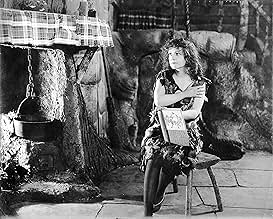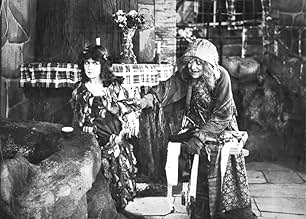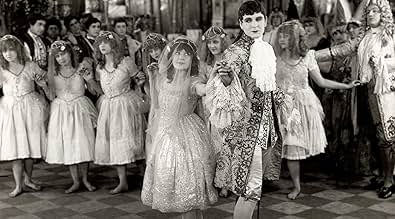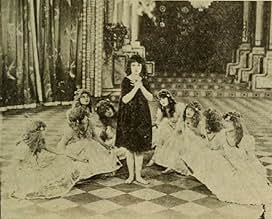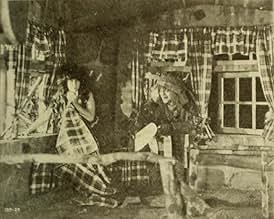अपनी भाषा में प्लॉट जोड़ेंSnow White, a beautiful girl, is despised by a wicked queen who tries to destroy her. With the aid of dwarves in the woods, Snow White overcomes the queen.Snow White, a beautiful girl, is despised by a wicked queen who tries to destroy her. With the aid of dwarves in the woods, Snow White overcomes the queen.Snow White, a beautiful girl, is despised by a wicked queen who tries to destroy her. With the aid of dwarves in the woods, Snow White overcomes the queen.
Dorothy Cumming
- Queen Brangomar
- (as Dorothy G. Cumming)
Richard Barthelmess
- Pie Man
- (बिना क्रेडिट के)
Arthur Donaldson
- King
- (बिना क्रेडिट के)
Irwin Emmer
- Dwarf
- (बिना क्रेडिट के)
Billy Platt
- Dwarf
- (बिना क्रेडिट के)
Herbert Rice
- Dwarf
- (बिना क्रेडिट के)
Jimmy Rosen
- Dwarf
- (बिना क्रेडिट के)
फ़ीचर्ड समीक्षाएं
It being Christmas, Santa Claus enters (stage left) through the chimney, magically makes a decorated tree appear (begging the question, "Why didn't this household already have one?"); then, he deposits a set of theatrical dolls on a nearby table. They come to life and play-out the story of "Snow White (and the Seven Dwarfs)"
Our heroine's beautiful queen mother bears a little princess "with skin white as snow, lips red as blood, and hair black as ebony." She grows into the fairest Marguerite Clark (as Snow White). This rattles jealously wicked Dorothy Cumming (as Brangomar), who wants to be the most beautiful woman in town. She goes to bald-headed Alice Washburn (as Witch Hex), who grants Ms. Cumming both loveliness and a truth-telling "Magic Mirror"; in return, the Witch demands that, "in the future, she would receive the heart of Snow White." Mr. Washburn plans to use Clark's heart as a hair-growing tonic.
Within a year, Ms. Clark's mother dies. The newly-lovely Cumming marries the king just before he dies, then turns Clark into a "Cinderella"-like servant. Of course, this doesn't stop visiting prince Creighton Hale (as Florimond) from falling in love with Clark. Wicked Queen Cumming is upset that handsome Mr. Hale didn't propose to her, despite his being much younger; Cumming tells Hale she will allow him to wed Clark, after the Princess spends a year in boarding school. Actually, Cumming sends Clark on a wild goose chase, and orders huntsman Lionel Braham (as Berthold) to go rip out her heart!
This is the thoroughly charming original film version of Clark's beloved stage play "Snow White and the Seven Dwarfs" (1912) which was, as you'll see, the blueprint for Walt Disney's famous 1937 version. Mr. Disney saw this as a teenager, and was obviously enchanted. By 1916, Clark was rivaling Mary Pickford in popularity, and challenging her for highly-sought Christmas box office receipts. All this, despite the fact that Clark a decade older, and didn't like making movies. Still, she is the fairest "Snow White" of all, and hopefully more of her films will be found (like "Wildflower" and "Prunella").
For modern viewers, an initial weakness will be the film's certain staginess - but, director J. Searle Dawley and Paramount's "Famous Players" did not seek to simply film a stage play. Witness the editing, variety of shots, and constant movement of the performers on screen. Some good examples are Clark's walking down the center of the screen, after meeting Hale; and, her discovery of the Dwarf cottage in the woods. "Snow White" compensates for the fact that the screen, unlike the live stage, is flat. This is not the style of film-making which became standard, but it is an example of how to make it lively.
******** Snow White (12/25/16) J. Searle Dawley ~ Marguerite Clark, Creighton Hale, Dorothy Cumming, Lionel Braham
Our heroine's beautiful queen mother bears a little princess "with skin white as snow, lips red as blood, and hair black as ebony." She grows into the fairest Marguerite Clark (as Snow White). This rattles jealously wicked Dorothy Cumming (as Brangomar), who wants to be the most beautiful woman in town. She goes to bald-headed Alice Washburn (as Witch Hex), who grants Ms. Cumming both loveliness and a truth-telling "Magic Mirror"; in return, the Witch demands that, "in the future, she would receive the heart of Snow White." Mr. Washburn plans to use Clark's heart as a hair-growing tonic.
Within a year, Ms. Clark's mother dies. The newly-lovely Cumming marries the king just before he dies, then turns Clark into a "Cinderella"-like servant. Of course, this doesn't stop visiting prince Creighton Hale (as Florimond) from falling in love with Clark. Wicked Queen Cumming is upset that handsome Mr. Hale didn't propose to her, despite his being much younger; Cumming tells Hale she will allow him to wed Clark, after the Princess spends a year in boarding school. Actually, Cumming sends Clark on a wild goose chase, and orders huntsman Lionel Braham (as Berthold) to go rip out her heart!
This is the thoroughly charming original film version of Clark's beloved stage play "Snow White and the Seven Dwarfs" (1912) which was, as you'll see, the blueprint for Walt Disney's famous 1937 version. Mr. Disney saw this as a teenager, and was obviously enchanted. By 1916, Clark was rivaling Mary Pickford in popularity, and challenging her for highly-sought Christmas box office receipts. All this, despite the fact that Clark a decade older, and didn't like making movies. Still, she is the fairest "Snow White" of all, and hopefully more of her films will be found (like "Wildflower" and "Prunella").
For modern viewers, an initial weakness will be the film's certain staginess - but, director J. Searle Dawley and Paramount's "Famous Players" did not seek to simply film a stage play. Witness the editing, variety of shots, and constant movement of the performers on screen. Some good examples are Clark's walking down the center of the screen, after meeting Hale; and, her discovery of the Dwarf cottage in the woods. "Snow White" compensates for the fact that the screen, unlike the live stage, is flat. This is not the style of film-making which became standard, but it is an example of how to make it lively.
******** Snow White (12/25/16) J. Searle Dawley ~ Marguerite Clark, Creighton Hale, Dorothy Cumming, Lionel Braham
Adapted by Winthrop Ames from his own 1912 Broadway adaptation of the tale published exactly a hundred years earlier by the Brothers Grimm, 'Snow White' was one of Adolph Zukor's Famous Players productions, the Famous Player on this occasion being Marguerite Clark in the role she had created on stage. Aged 33 when the film version was made but easily passing for a girl half her real age, Miss Clark is surrounded by a handsome if stagy production, lushly photographed by H. Lyman Broening, who when called upon also conjures up more spooky visuals for scenes such as down in the dwarfs' mine and - most vividly - the witch's lair; both of which can be recognised in the 1937 version produced by Walt Disney, who saw this as a 15 year-old. In this version, the witch and the wicked stepmother are separate characters; the former played for laughs by Alice Washburn, with Dorothy Cumming as the latter resembling Ellen Terry as Lady Macbeth in John Singer Sargent's famous 1889 portrait.
The 1916 film of "Snow White" is a screen adaptation of the 1912 Broadway play, written by Jessie Braham White. It tells the familiar tale of the "Stepmother from Hell" and the princess with "skin as white as snow, lips as red as blood and hair as black as night". It was thought to have been lost, until the George Eastman House located a print in a Danish film vault.....and the film world is so lucky they did!
Marguerite Clark recreates her Broadway role as "Snow White", and must have been born to play this faerie tale heroine!!! She is the epitome of this character!!!! I only wish that I was alive in 1912 to see her do the role live on stage.
Creighton Hale (The Cat and the Canary) is dashing as Prince Florimond, Snow White's love interest. It is a thankless role, but he manages to shine.
Dorothy Cumming is the vain "Queen Brangomar", Snow White's nemisis. It's ironic that years later she would play the "Virgin Mary" in "King of Kings".....quite a turn around!!!
The rest of the cast handles their roles equally as well as the above mentioned......including Lionel Braham (A Christmas Carol) as "Berthold the Huntsman", and Alice Washburn as "Witch Hex".
Hollywood folklore says that this is the film that inspired Walt Disney to create his animated classic. The similarities between the two are amazing! In the opening of the 1916 film, Snow White is a kitchen maid, going about her daily duties.....very much like Disney's heroine scrubbing the castle steps and crooning to doves. A little brown bird shows Snow White the way to the dwarfs' cottage....just like the animated animals did for her in the cartoon. She also cleans up the cottage, in both versions, before the dwarfs come home, and then falls asleep.
I highly recommend seeking out a copy of this film!!!!
Marguerite Clark recreates her Broadway role as "Snow White", and must have been born to play this faerie tale heroine!!! She is the epitome of this character!!!! I only wish that I was alive in 1912 to see her do the role live on stage.
Creighton Hale (The Cat and the Canary) is dashing as Prince Florimond, Snow White's love interest. It is a thankless role, but he manages to shine.
Dorothy Cumming is the vain "Queen Brangomar", Snow White's nemisis. It's ironic that years later she would play the "Virgin Mary" in "King of Kings".....quite a turn around!!!
The rest of the cast handles their roles equally as well as the above mentioned......including Lionel Braham (A Christmas Carol) as "Berthold the Huntsman", and Alice Washburn as "Witch Hex".
Hollywood folklore says that this is the film that inspired Walt Disney to create his animated classic. The similarities between the two are amazing! In the opening of the 1916 film, Snow White is a kitchen maid, going about her daily duties.....very much like Disney's heroine scrubbing the castle steps and crooning to doves. A little brown bird shows Snow White the way to the dwarfs' cottage....just like the animated animals did for her in the cartoon. She also cleans up the cottage, in both versions, before the dwarfs come home, and then falls asleep.
I highly recommend seeking out a copy of this film!!!!
Supposedly this what got Disney's mind oriented toward cartoon versions of well known "fairy tales."
But we can hardly blame it for the patronizing travesty he has performed on children's literature. The story here is a bit Bolwderized (some sex, and much cruelty have been removed from the traditional version). But it is still complex and has lots of side stories, like how she disguises herself as one of her maids in waiting. And how the stepmother tried a comb first, before the apple.
The structure of the play on which this is based is supposedly influenced by the revival of Macbeth then current in London, where the Shakespeare story is explained as controlled by the three witches. Here it is almost as if the witch were responsible for the Faustian deal the ugly stepmother makes.
This film was conceived as a direct result of the amazing popularity of "Birth of a Nation," perhaps the most influential film in history. That's because Birth cemented the notion that movies are like plays not an entirely predetermined outcome. This was the first big budget play to be movie-ized afterward.
The film is in bad condition, so you have to imagine which cuts were original and which are because of missing segments. I prefer to imagine most of the jumps as missing material because the thing moves so languorously in what we see. For instance, there's a clearly drawn Queen's Toady who we spend many minutes watching in pompous walk.
Ted's Evaluation -- 2 of 3: Has some interesting elements.
But we can hardly blame it for the patronizing travesty he has performed on children's literature. The story here is a bit Bolwderized (some sex, and much cruelty have been removed from the traditional version). But it is still complex and has lots of side stories, like how she disguises herself as one of her maids in waiting. And how the stepmother tried a comb first, before the apple.
The structure of the play on which this is based is supposedly influenced by the revival of Macbeth then current in London, where the Shakespeare story is explained as controlled by the three witches. Here it is almost as if the witch were responsible for the Faustian deal the ugly stepmother makes.
This film was conceived as a direct result of the amazing popularity of "Birth of a Nation," perhaps the most influential film in history. That's because Birth cemented the notion that movies are like plays not an entirely predetermined outcome. This was the first big budget play to be movie-ized afterward.
The film is in bad condition, so you have to imagine which cuts were original and which are because of missing segments. I prefer to imagine most of the jumps as missing material because the thing moves so languorously in what we see. For instance, there's a clearly drawn Queen's Toady who we spend many minutes watching in pompous walk.
Ted's Evaluation -- 2 of 3: Has some interesting elements.
Adolph Zukor's company Famous Players in Famous Plays, despite releasing some stagy early feature-length films (e.g. "Queen Elizabeth" (1912) and "The Count of Monte Cristo" (1913)), managed to sign two actresses who become two of the most popular movie stars, Mary Pickford and, the star of "Snow White", Marguerite Clark. Clark had already been a hit on Broadway, including playing the title role in the 1912 theatrical version of "Snow White", for which this film is based. In just her first film, Clark's performance in "Wildflower" (1914) was voted by fans for Motion Picture Magazine the second greatest performance to date by 1916--right above Henry B. Walthall's third place role in "The Birth of a Nation" (1915). As further evidence of her fame, Clark was voted the second most popular movie star in a 1918 Motion Picture Magazine poll, below only Mary Pickford. A Princeton poll in 1919 placed her third among screen actresses. And, she was voted the top female box-office draw by a 1920 Quigley poll.
The filmed "Snow White" is comparable in film technique to another available Famous Plays production, "Cinderella" (1914), which starred Mary Pickford (also to Pickford's "The Taming of the Shrew" (1914), although the print of it that I saw wasn't in the good condition these other two films are in). The camera generally remains stationary as in the earliest feature-length films and mostly from a long-shot framing, but the shot succession is more frequent and better paced in these later films—changing shots based on character movement and with some crosscutting—and there are a few medium shots and closer views, although not nearly enough. "Snow White" seems choppy in parts today, but that's at least partially due to some lost footage.
Although rather stagy even for a 1916 production, "Snow White" is a somewhat enjoyable, light fairytale. As mentioned elsewhere, it borrows from "Cinderella" the part of Snow White forced to do chores by her stepmother. It's also interesting to see Walt Disney's inspiration for his 1937 animated version. The dwarfs are amusing. Additionally, Snow White is friendly with animals in the forests. I don't know how a lion got to a woodland in what one assumes is somewhere in medieval Europe, though. There are a few special effects shots, including the basic superimpositions and substitution-splices for lapse dissolves, as well as a brief animation shot of the witch flying away on her broom, and the miniaturized double exposure of the actors in the introductory tie-in of the film's release with Christmas. Clark does as well as Mary Pickford did; and, unlike the film, she isn't too theatrical. Like Pickford, she was small and often played child and ingénue roles. Unfortunately, most of her films are now unavailable, which makes "Snow White" an even more recommended treat.
The filmed "Snow White" is comparable in film technique to another available Famous Plays production, "Cinderella" (1914), which starred Mary Pickford (also to Pickford's "The Taming of the Shrew" (1914), although the print of it that I saw wasn't in the good condition these other two films are in). The camera generally remains stationary as in the earliest feature-length films and mostly from a long-shot framing, but the shot succession is more frequent and better paced in these later films—changing shots based on character movement and with some crosscutting—and there are a few medium shots and closer views, although not nearly enough. "Snow White" seems choppy in parts today, but that's at least partially due to some lost footage.
Although rather stagy even for a 1916 production, "Snow White" is a somewhat enjoyable, light fairytale. As mentioned elsewhere, it borrows from "Cinderella" the part of Snow White forced to do chores by her stepmother. It's also interesting to see Walt Disney's inspiration for his 1937 animated version. The dwarfs are amusing. Additionally, Snow White is friendly with animals in the forests. I don't know how a lion got to a woodland in what one assumes is somewhere in medieval Europe, though. There are a few special effects shots, including the basic superimpositions and substitution-splices for lapse dissolves, as well as a brief animation shot of the witch flying away on her broom, and the miniaturized double exposure of the actors in the introductory tie-in of the film's release with Christmas. Clark does as well as Mary Pickford did; and, unlike the film, she isn't too theatrical. Like Pickford, she was small and often played child and ingénue roles. Unfortunately, most of her films are now unavailable, which makes "Snow White" an even more recommended treat.
क्या आपको पता है
- ट्रिवियाThe first movie Walt Disney ever saw.
- गूफ़A crew member's shadow is visible on the ground in front of Snow White after Berthold the Huntsman leaves her in the forest.
- इसके अलावा अन्य वर्जनOriginal release prints contained, according to a review by Variety, a sequence in which a stork delivers the infant Snow White to her mother, is not in the Treasures from American Film Archives print.
- कनेक्शनFeatured in The Walt Disney Story (1973)
टॉप पसंद
रेटिंग देने के लिए साइन-इन करें और वैयक्तिकृत सुझावों के लिए वॉचलिस्ट करें
- How long is Snow White?Alexa द्वारा संचालित
विवरण
- चलने की अवधि1 घंटा 3 मिनट
- रंग
- ध्वनि मिश्रण
- पक्ष अनुपात
- 1.33 : 1
इस पेज में योगदान दें
किसी बदलाव का सुझाव दें या अनुपलब्ध कॉन्टेंट जोड़ें


